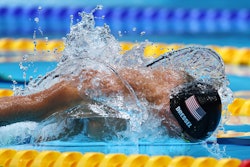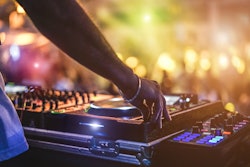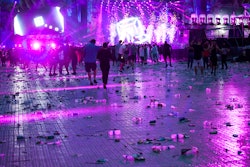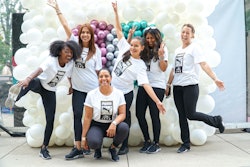
Events are, by nature, fleeting—but they can live on through photography. Great event photography can be an invaluable tool for both practical and emotional purposes, furthering future promotional efforts while also helping foster lasting memories in your attendees. But how do you ensure you're getting the most bang for your buck? BizBash caught up with three experienced corporate event photographers, who shared their tips for finding the right partner, clearly communicating your goals, fostering ongoing relationships, and more.
1. Understand the power of good event photography.
First things first: To get high-quality photos from your next event, you need to appreciate why event photography is so important. “Exceptional event photography plays a pivotal role in narrating the unfolding story of meticulously planned moments,” explains Daniel J. Vasquez, president of Daniel J Vasquez Productions Inc. in New York, who specializes in capturing corporate and social events, along with live music. “Photography immortalizes these instances in time. Event photography holds special significance, whether it's a once-in-a-lifetime occasion or a weekly recurring event, as it captures unique people and moments that can never be replicated.”
It can have practical purposes too, like for marketing and promotion, points out Gene X Hwang, COO and co-founder of Orange Photography, a San Francisco-based corporate event photography company that works with a variety of high-profile clients. “Also for planners, images can provide valuable documentation to reference. Additionally, often after an event, all you may have is images as evidence of what was done, and they can be used in case studies and to inspire other potential clients in what you can do with a specific venue and/or type of event.”
As the son of an event planner, photographer Dale "DJ" Falk Jr.—the Atlanta-based executive producer of photography and media production company Network Frequency LLC—understands “the detail and intentionality behind various aspects of the production that many need an entire career to figure out,” he says. “When you bring in a photographer who knows how to engage and when to engage, and enjoys the creativity around the challenge of waiting for the perfect shot, you get something special.”  "A skilled photographer captures the moments that matter most in a way that will memorialize the experience that’s been created," says Dale "DJ" Falk Jr.Photo: Network Frequency, LLC
"A skilled photographer captures the moments that matter most in a way that will memorialize the experience that’s been created," says Dale "DJ" Falk Jr.Photo: Network Frequency, LLC
2. Look for photographers with previous event experience.
Look through a photographer’s portfolio to see if they’ve worked on similar projects. For example, a headshot photographer may not have experience with the fast-paced world of trade shows, or a wedding photographer might not have the right style for a corporate conference. “Having experience with the size and scope of a client or event is very important,” explains Hwang. “Also, in some cases, having experience with the venue can be helpful—and lately, insurance and other liability coverage seems to be of more and more importance to many clients and venues.”
To start your search, Hwang suggests looking for photographers who have examples of work at similar events. “Often, you can find good resources through local event organizations like ILEA and MPI, which often include suppliers such as photographers. Also, travel and convention bureaus can often provide input on who in their area shoots events.”
And while social media can be a great tool, Vasquez cautions against leaning too heavily on it when searching for a photographer. “Instagram, while popular, may not always be the best platform for finding suitable talent to hire. Often, individuals with the highest follower counts appear first, but this doesn't guarantee they are the right fit for the specific job,” he points out.  "Exceptional event photography plays a pivotal role in narrating the unfolding story of meticulously planned moments. Photography immortalizes these instances in time," says Daniel J. Vasquez.Photo: Daniel J Vasquez Productions
"Exceptional event photography plays a pivotal role in narrating the unfolding story of meticulously planned moments. Photography immortalizes these instances in time," says Daniel J. Vasquez.Photo: Daniel J Vasquez Productions
3. Lean on referrals.
Tied into the point above, our experts all advise leaning into referrals. “If I were an event planner, my first approach would be to seek recommendations from fellow event planners,” says Vasquez, who notes that approximately 80% of his event photography assignments come through word-of-mouth referrals. Plus, he adds, “I find a higher level of comfort when collaborating with recommendations by trusted clients, rather than someone randomly from social media.”
Falk agrees with the power of referrals. “Go to another event planner, go to a networking event, go out into the community and find those who hire these services, then get their recommendations,” he says. “Usually, a professional will have a portfolio, website, and social media—however, you simply cannot beat having a colleague say, ‘I needed these photos done right and returned quickly, and they absolutely nailed it.’”
4. Book your photographer early in the planning process.
As for when to secure a photographer, Vasquez advises it should come early in the process—ideally right after confirming an event date and booking a venue. “A notable pet peeve is being asked to photograph an event at the last minute,” he says. “Typically, photographers tend to be at the bottom of an event planner's checklist, despite having a crucial role in preserving memories and creating valuable marketing material.”  "Photographing events has been really rewarding for us at Orange," says Hwang. "We love the diversity of events we cover, and being witness to so many amazing things over the years."Photo: Orange Photography
"Photographing events has been really rewarding for us at Orange," says Hwang. "We love the diversity of events we cover, and being witness to so many amazing things over the years."Photo: Orange Photography
5. Clearly communicate your needs.
Remember that photographers are interviewing you too—and they’ll notice if you’re not clearly communicating. “For us, we look for clients that know what they are looking for, have reasonable budgets, and who seem to know and value their event production,” says Hwang. “Mostly it's probably a lot like how you would hire any event professional—you are looking for competence, professionalism, and great communication skills.”
Vasquez likes some of these initial conversations to take place via email; he advises clients to share any past photos they admire and would like to emulate, along with a shot list, a guest list highlighting key members to focus on, and any other important details. He always makes sure to schedule a brief follow-up call, though, “to establish a more personal connection with a potential client, allowing me to gauge their personality. These initial minutes often provide insight into whether I can establish an intangible connection with the client.”
Falk sees event photography as a collaboration, and “good collaboration comes from communication,” he says. Personally, he considers it a red flag when clients are vague on their needs or unsure about their dates or budget. On the flip side, photographers should also be communicating clearly. “The good ones will always be upfront on their availability, gear, pricing, and realistic turnaround time,” Falk notes. “And please, please, please—don’t let someone tell you that they are a professional that uses a phone! It’s just not the same.”
6. Tell your photographer what you’ll be using the shots for.
Another useful conversation to have early on? Establishing your goals, or how you’ll be using the photos after the event wraps—whether it’s for documentation, marketing, or something else. “It's important to know who the final audience(s) might be,” says Hwang. “For example, for the end client, often they want to show that their event was well attended, included a diverse audience, and created connections and forged new friendships. Maybe they want to show that attendees can learn and be engaged by the content—so having these end goals in mind is very helpful.”  "Throughout my years as an event photographer, I’ve always found that candid photography was my favorite. ... There’s really nothing better than being present where humanity is shining through lives being lived, and having the honor to photograph it," says Falk.Photo: Network Frequency, LLC
"Throughout my years as an event photographer, I’ve always found that candid photography was my favorite. ... There’s really nothing better than being present where humanity is shining through lives being lived, and having the honor to photograph it," says Falk.Photo: Network Frequency, LLC
7. Focus on lighting, and be open to candid shots.
Trying to get great photography from your event? Think about your lighting. “Bad lighting is the biggest pet peeve, or having speakers stand in terribly lit areas,” says Hwang. “This makes our job harder—but often means the audience can also not see them well.”
And while there are, of course, some must-have shots at every event, Falk finds that candid photography can often have the biggest impact. “I love shooting with a telephoto lens to the side of an event to capture the little moments and experiences detailed throughout the faces of the attendees,” he says. “There’s really nothing better than being present where humanity is shining through lives being lived, and having the honor to photograph it.”  "If you plan your events well in advance, immediately after booking a venue or confirming an event date, it's a good practice to secure your photographer," says Vasquez.Photo: Daniel J Vasquez Productions
"If you plan your events well in advance, immediately after booking a venue or confirming an event date, it's a good practice to secure your photographer," says Vasquez.Photo: Daniel J Vasquez Productions
8. Treat photographers with respect.
Having grown up immersed in the event world, Falk emphasizes the importance of respect in the stressful world of events. “I don’t care who you are, what you make, or the title you have: If you’ve never stayed up for 16-plus hours on set working to ensure that the attendees enjoy their experience together, then you don’t have a right to speak on events,” he says. “Anyone that walks into an event and does not treat the staff and team around the production with respect is something that I can’t stand. I expect clients to respect myself and other photographers too.”
He adds, “Events overall are the lifeblood for a solid number of brands and businesses. They get your people together, they get your message out, and they showcase the potential of what your brand can be. It takes a special kind of professional to capture that.” Another crucial tip from Falk? “Feed your photographers!”
9. Establish an ongoing relationship—and pay them what they’re worth!
Found an event photographer you like? Work with them again! “If you host numerous events throughout the year, it's a wise idea to explore the option of a retainer agreement,” notes Vasquez. “Personally, I would be open to adjusting my rates slightly in exchange for the security of guaranteed monthly income.”
Above all, recognize the value that comes with great event photography. “My No. 1 advice is to look at this collaboration and partnership as an investment into your production,” sums up Falk. “Great photography costs money. If you need a way to justify obtaining greatness, just tell your team that the thousands you're probably spending on great food will be gone (or wasted) at that event—while the thousands on your photos will last you a lifetime.”



















